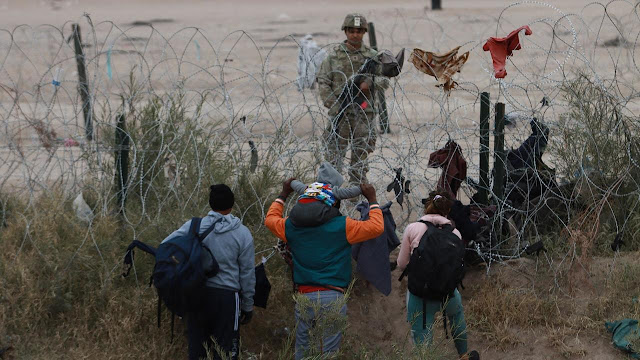The US-Mexico border has
long been a contentious political arena, and the latest flashpoint involves
razor wire. In a highly anticipated decision, the Supreme Court ruled on
January 22nd, 2024, that the Biden administration has the authority to remove
razor wire fencing installed by the state of Texas along sections of the Rio
Grande. This marks a significant victory for the federal government and
immigration rights advocates, who argued that the razor wire posed safety
hazards and impeded Border Patrol operations.
Texas Takes Up the Razor Wire Mantle
In an attempt to curb
illegal immigration, Texas Governor Greg Abbott authorized the installation of
razor wire fencing along portions of the Rio Grande in 2023. The move was met
with immediate criticism from the Biden administration, which argued that the
wire hampered Border Patrol agents' ability to apprehend migrants and posed a
danger to both agents and civilians. The federal government subsequently filed
a lawsuit against Texas, seeking to remove the razor wire.
A Legal Tug-of-War Escalates to the Supreme Court
A lower court initially
sided with the Biden administration, but the Fifth Circuit Court of Appeals
reversed the decision, upholding Texas' right to install the razor wire. This
prompted the Biden administration to appeal to the Supreme Court, setting the
stage for a showdown over federal and state authority at the border.
Supreme Court Untangles the Barbed Issue
In a 5-4 decision, the
Supreme Court sided with the Biden administration, paving the way for the
removal of the razor wire fencing. The majority opinion, written by Justice
Sonia Sotomayor, emphasized the federal government's paramount authority over
immigration matters and border security. The Court also expressed concerns about
the safety risks posed by the razor wire, noting that it could injure not only
migrants but also Border Patrol agents and wildlife.
Beyond the Barbed Wire: Broader Implications of the Ruling
The Supreme Court's
decision has significant implications beyond the immediate issue of the razor
wire fencing. It reaffirms the federal government's preeminence in immigration
policy and border control, setting a precedent that could limit the ability of
states to unilaterally take action on these issues. The ruling also underscores
the Court's willingness to intervene in politically charged disputes,
particularly when matt
Reactions to the Razor Wire Reckoning
The Supreme Court's
decision was met with mixed reactions. Immigration rights groups and Democrats hailed
the ruling as a victory for human rights and border security. They argued that
the razor wire was inhumane and ineffective and that its removal would allow
Border Patrol agents to carry out their duties more safely and efficiently.
Republicans and some
border security advocates, however, expressed concerns about the decision. They
argued that the razor wire was a necessary deterrent to illegal immigration and
that its removal would embolden migrants to cross the border illegally. They
also raised concerns about the potential for increased illegal drug trafficking
and crime in border communities.
Lingering Questions and Uncertain Path Forward
While the Supreme
Court's decision resolves the immediate question of the razor wire fencing, it
leaves open broader questions about immigration policy and border security. The
Biden administration still faces the challenge of addressing the root causes of
illegal immigration, such as poverty and violence in Central America.
Additionally, the issue of border security is likely to remain a contentious
political issue, with Republicans and Democrats holding vastly different views
on how to best manage the flow of people and goods across the US-Mexico border.
Looking Ahead: A Razor-Thin Balance
The Supreme Court's
decision on the razor wire fencing is a reminder of the complex and
often-fraught balance between federal and state authority, national security,
and human rights. It is a decision that will be debated and dissected for years
to come, and its long-term impact on immigration policy and border security
remains to be seen. One thing is certain, however: the razor wire saga is far
from over, and the US-Mexico border will continue to be a testing ground for
some of America's most pressing political and humanitarian challenges.



.png)

No comments: